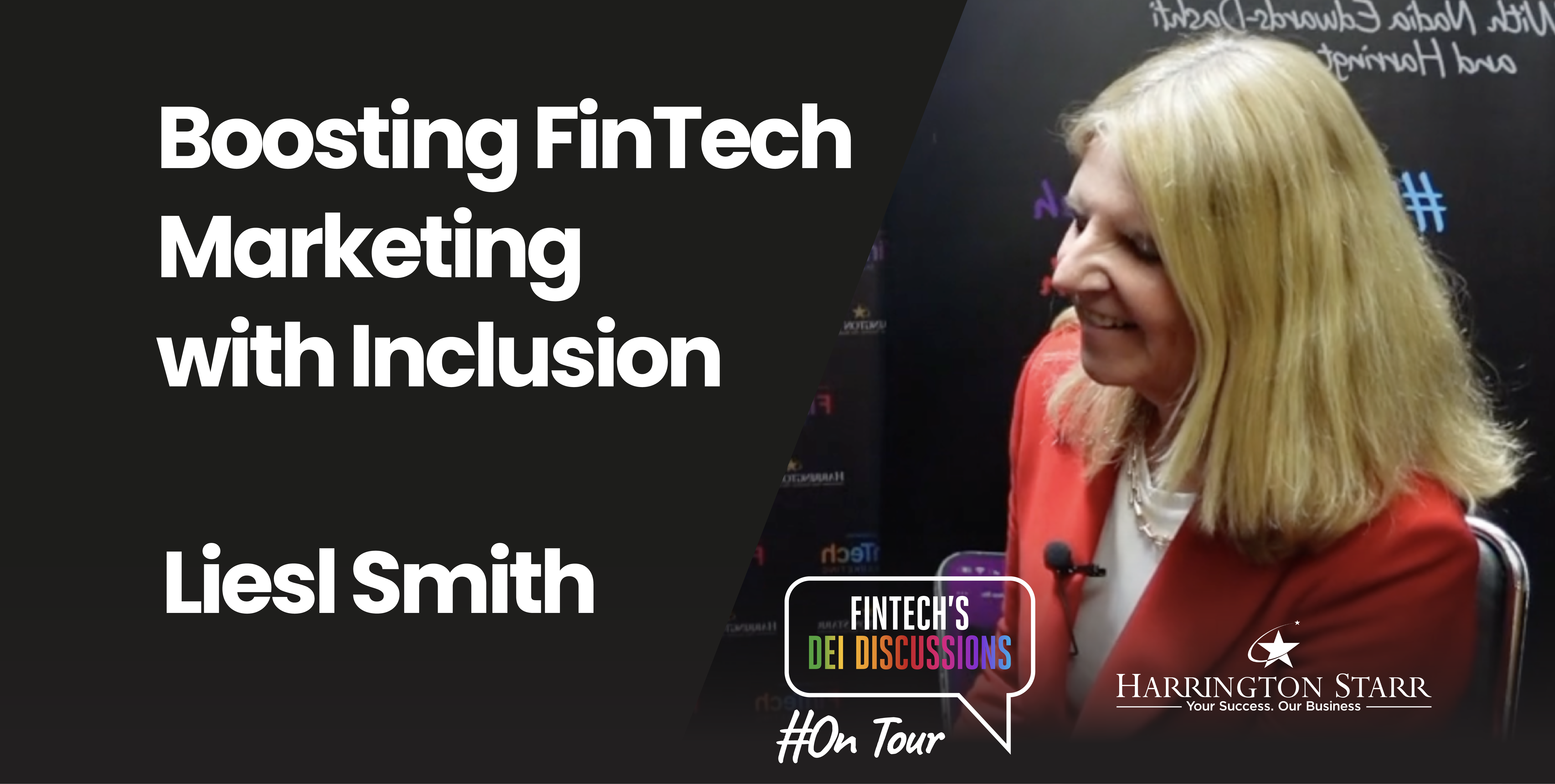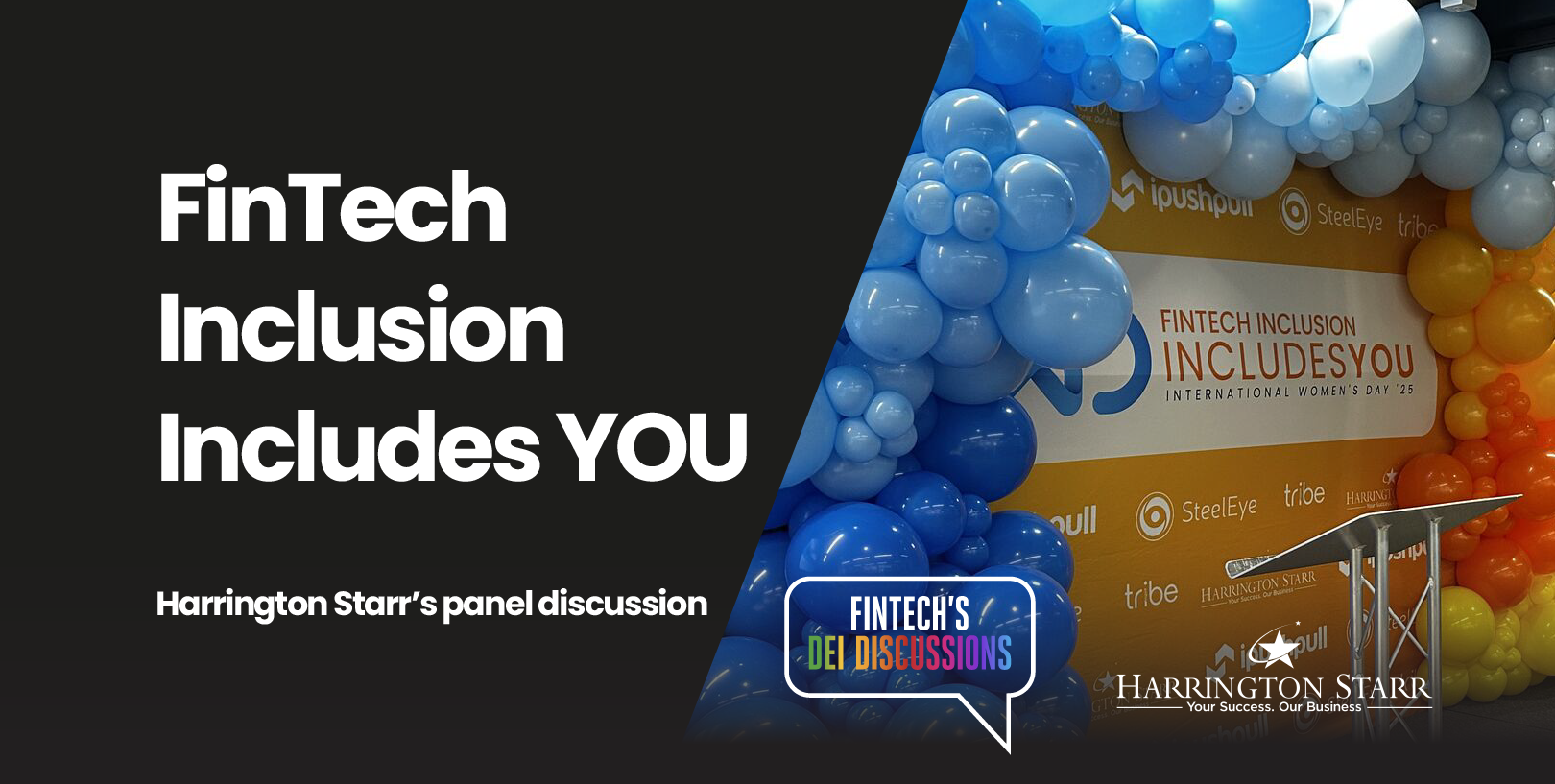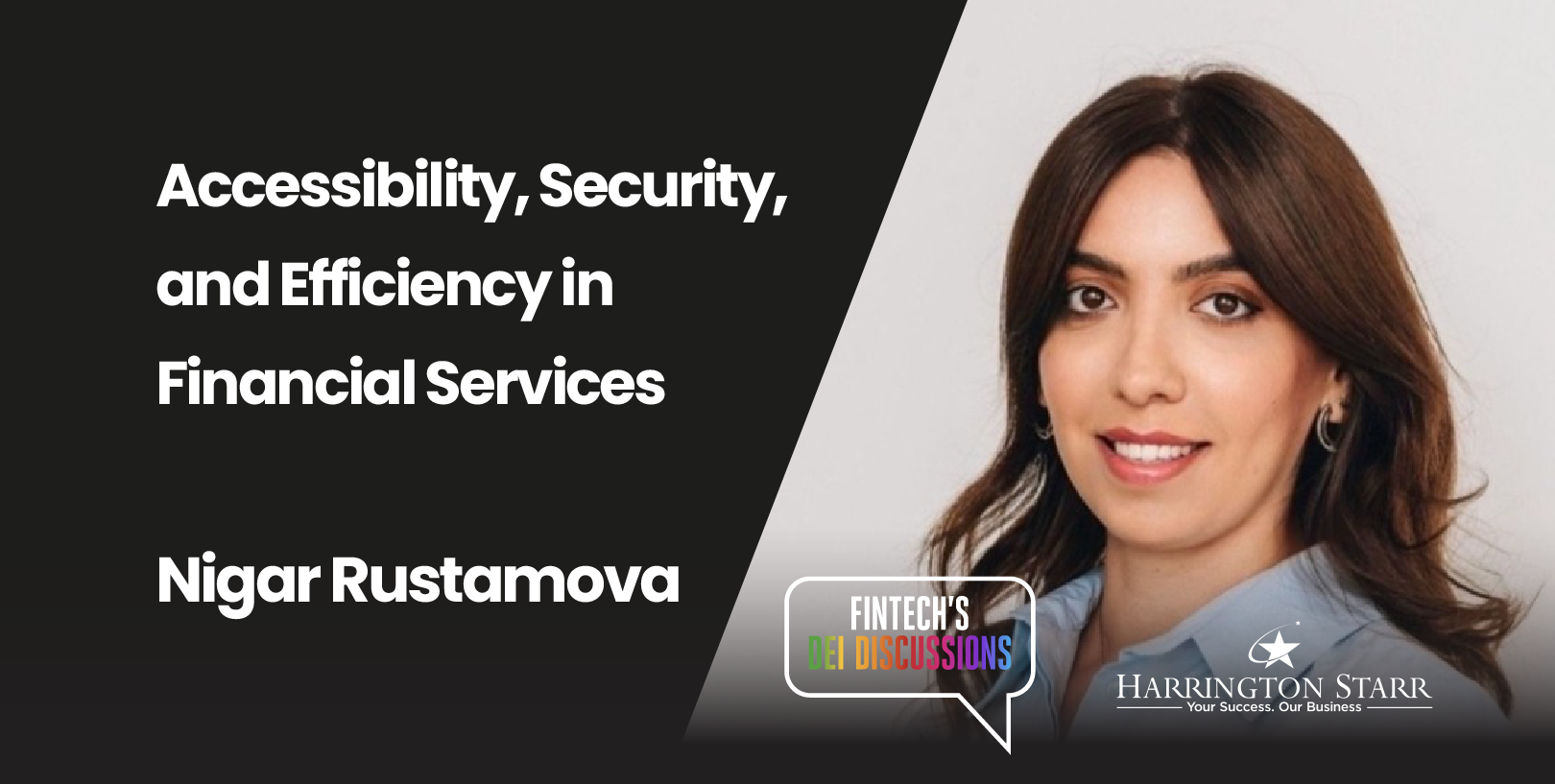
In the ever-evolving world of financial technology, diversity and inclusion play a pivotal role in shaping the industry's future. On a special episode of FinTech’s DEI Discussions, hosted by Nadia at Payal Raina's B2B Marketing Community Conference, Liesl Smith, Senior Vice President of Global Marketing at FreedomPay, delved into the significance of diversity, equity, and inclusion (DEI) within the fintech sector. This insightful discussion not only shed light on Liesl's remarkable journey from journalism to fintech but also emphasised the importance of inclusive practices in fintech recruitment and careers.
The Journey from Journalism to FinTech Careers
Liesl's transition from a seasoned journalist at the BBC to a prominent figure in fintech marketing is a testament to the dynamic nature of fintech careers. Her extensive experience in journalism, which spanned nearly 20 years, provided her with a unique perspective on storytelling, communication, and strategic thinking—skills that are highly valuable in the fintech industry. Liesl's journey underscores the fact that fintech careers are not limited to individuals with traditional financial backgrounds. Instead, the industry thrives on diverse talents and skill sets, making it an attractive field for professionals from various domains.
Her decision to leave the BBC and pursue a Master's degree in business strategy and marketing marked a significant turning point. It was a bold move that required courage and a clear vision for her future. Liesl's experience serves as an inspiration for those contemplating a career switch, illustrating that with determination and the right opportunities, one can successfully transition into fintech and make a meaningful impact.
The Role of Diversity in FinTech Recruitment
One of the key takeaways from Liesl's discussion is the critical role of diversity in fintech recruitment. Liesl emphasised that merely having a token woman or minority in the room is not enough to drive meaningful change. She highlighted a report by McKinsey, which revealed that having 30 to 40 percent of women in a room is essential for them to feel comfortable speaking up and participating in debates. This insight underscores the importance of fintech recruiters and fintech recruitment agencies in ensuring that diverse candidates are not only hired but also feel empowered to contribute to their fullest potential.
Diversity in recruitment goes beyond gender representation. It encompasses various dimensions, including race, ethnicity, age, sexual orientation, and disability. At Harrington Starr, our Talent Equity List campaign is designed to help you adopt inclusive hiring practices that attract a diverse range of candidates. This includes creating job descriptions that appeal to diverse applicants, implementing blind recruitment processes to eliminate biases, and fostering an inclusive company culture where all employees feel valued and supported.
Challenges and Triumphs in FinTech Marketing Jobs
Liesl's journey in fintech marketing has been marked by both challenges and triumphs. Transitioning from journalism to fintech marketing jobs required her to acquire new skills and adapt to a rapidly changing industry. Liesl's success in this field can be attributed to her strategic mindset, ability to leverage partnerships, and deep understanding of data-driven marketing. Her story serves as an inspiration for individuals considering a switch to fintech marketing jobs, demonstrating that with determination and continuous learning, it is possible to excel in this dynamic field.
One of the significant challenges Liesl faced was understanding the technical aspects of fintech. Unlike journalism, fintech marketing requires a deep understanding of complex financial products and services. To overcome this, Liesl invested time in learning about the industry, attending conferences, and networking with experts. This proactive approach enabled her to build a solid foundation in fintech and effectively communicate its value to diverse audiences.
Creating Inclusive Work Environments in FinTech Jobs
In this episode, Liesl stressed the importance of creating inclusive work environments in fintech jobs. She pointed out that inclusive leadership and a supportive network are crucial for fostering a culture where diverse perspectives are valued and respected. Liesl's emphasis on inclusivity aligns with the broader goals of fintech recruitment agencies, which aim to build teams that reflect the diverse customer base of the fintech industry. By prioritising inclusivity, fintech companies can attract and retain top talent, drive innovation, and enhance their overall performance.
Inclusive work environments are characterised by open communication, mutual respect, and equal opportunities for growth. Fintech companies must implement policies that promote diversity and inclusion, such as flexible working arrangements, mentorship programmes, and diversity training. These initiatives create a supportive atmosphere where employees feel comfortable expressing their ideas and contributing to the company's success.
The Significance of Partnerships in FinTech Marketing
Partnerships play a vital role in fintech marketing, and Liesl's experience at FreedomPay highlights their significance. During the discussion, she shared how FreedomPay's partnerships with industry giants like WorldPay have been instrumental in elevating the company's position in the market. These collaborations not only enhance brand visibility but also enable fintech companies to leverage each other's strengths and capabilities. For professionals seeking fintech marketing jobs, understanding the value of partnerships and how to effectively manage them is crucial for career success.
Effective partnerships require clear communication, shared goals, and mutual trust. Fintech companies must identify partners that complement their strengths and contribute to their strategic objectives. By working together, partners can create innovative solutions, expand their market reach, and deliver superior value to customers. Liesl's success with FreedomPay demonstrates the transformative power of strategic partnerships in fintech marketing.
The Future of FinTech Recruitment and Careers
As the fintech industry continues to evolve, the future of fintech recruitment and careers looks promising. Liesl's insights suggest that there will be an increasing demand for professionals with diverse backgrounds and skill sets. Fintech recruiters and fintech recruitment agencies will play a pivotal role in identifying and attracting such talent. Additionally, companies will need to invest in continuous learning and development programmes to ensure their employees stay updated with the latest industry trends and technologies.
The rapid pace of technological advancements in fintech necessitates a workforce that is adaptable and forward-thinking. Fintech companies must prioritise ongoing education and training to equip their employees with the skills needed to navigate new challenges. This commitment to professional development not only enhances employee satisfaction and retention but also drives innovation and competitiveness in the market.
Building a Supportive Network in FinTech Jobs
Building a supportive network is essential for career growth in fintech jobs. Liesl shared how having mentors, allies, and a strong professional network has been instrumental in her success. She encouraged individuals to seek out mentors and actively participate in industry events and conferences to expand their network. This advice is particularly valuable for those new to the fintech industry, as a robust network can provide guidance, support, and opportunities for career advancement.
Networking involves more than just attending events; it requires building genuine relationships with peers, industry leaders, and potential mentors. Fintech professionals should take advantage of online platforms, such as LinkedIn, to connect with others in the industry. Additionally, joining professional organisations and participating in industry forums can provide valuable insights and opportunities for collaboration.
Embracing Technology in FinTech Marketing Jobs
Technology is at the core of fintech, and embracing it is essential for success in fintech marketing jobs. Liesl discussed how data-driven marketing and technological advancements have transformed the way fintech companies operate. From understanding consumer behaviour to optimising marketing campaigns, technology enables marketers to make informed decisions and drive better results. For aspiring fintech marketers, staying updated with the latest technological trends and tools is crucial for staying competitive in the industry.
Technological advancements, such as AI and machine learning, have revolutionised fintech marketing. These technologies enable marketers to analyse vast amounts of data, identify patterns, and predict customer behaviour. By leveraging AI-driven insights, fintech companies can create personalised marketing campaigns that resonate with their target audience and drive engagement.
The Impact of Inclusive Leadership in FinTech Recruitment
Inclusive leadership has a profound impact on fintech recruitment and the overall success of a company. Liesl highlighted how leaders who prioritise diversity and inclusion create an environment where all employees feel valued and empowered. This, in turn, leads to higher employee satisfaction, improved collaboration, and increased innovation. Fintech recruiters and fintech recruitment agencies should seek out leaders who demonstrate a commitment to inclusivity, as they are key to building diverse and high-performing teams.
Inclusive leaders actively promote diversity by implementing equitable hiring practices, fostering a culture of respect, and ensuring that all voices are heard. They also provide opportunities for professional development and career advancement, enabling employees from diverse backgrounds to reach their full potential. By championing diversity and inclusion, leaders can drive organisational success and create a positive impact on the industry as a whole.
Navigating Career Transitions in FinTech
Liesl's career transition from journalism to fintech provides valuable insights for individuals considering similar moves. She emphasised the importance of setting clear goals, acquiring relevant skills, and being open to new opportunities. Liesl's story is a reminder that career transitions while challenging, can lead to fulfilling and successful careers in fintech. For those exploring fintech careers, being proactive, adaptable, and willing to learn are essential traits for navigating the industry's dynamic landscape.
Career transitions often involve stepping out of one's comfort zone and embracing new challenges. Liesl's experience demonstrates that with determination and a growth mindset, individuals can successfully pivot to fintech careers and make significant contributions. She also highlighted the importance of continuous learning, as staying updated with industry trends and acquiring new skills are crucial for career advancement in fintech.
The Path Forward for FinTech Recruitment and Careers
Nadia's discussion with Liesl Smith on FinTech’s DEI Discussions offers valuable perspectives on the importance of diversity, inclusion, and innovation in the fintech industry. Her journey from journalism to fintech marketing jobs highlights the potential for professionals from diverse backgrounds to thrive in this field. As the industry continues to grow, fintech recruiters and fintech recruitment agencies will play a crucial role in shaping the future of fintech recruitment and careers. By prioritising diversity, fostering inclusive work environments, and embracing technology, the fintech industry can continue to drive innovation and achieve sustainable growth.





